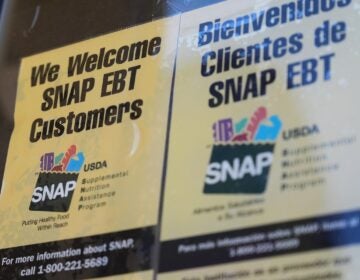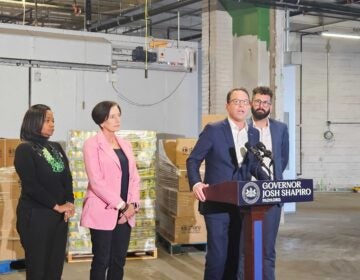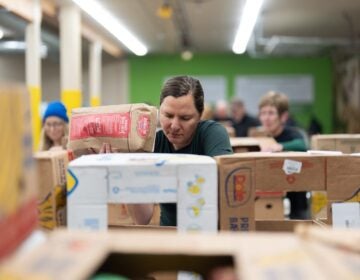With food insecurity still on the rise, N.J. may create cabinet role dedicated to fighting hunger
New Jerseyans in need continue to seek help from food pantries as the Legislature passes a bill to create the cabinet-level position of a Food Insecurity Advocate.
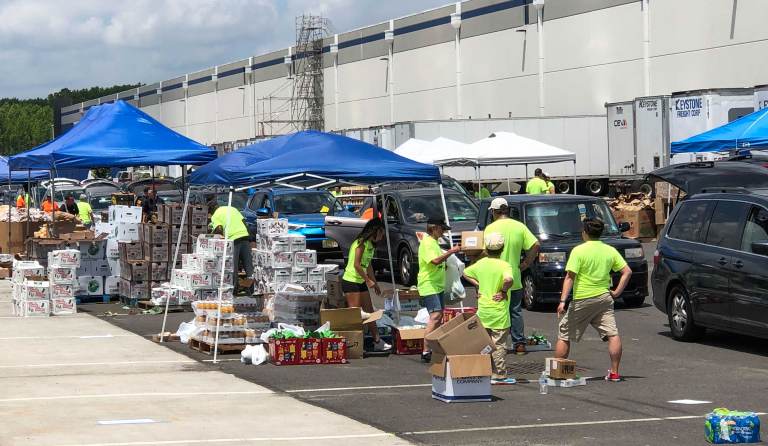
File photo: Volunteers load groceries into vehicles during a food distribution event in East Windsor, N.J., sponsored by the Trenton Area Soup Kitchen and RISE of Eastern Mercer County. (P. Kenneth Burns/WHYY)
About four hours before volunteers began distributing food, people were already waiting in line at a drive-through grocery giveaway event in Mercer County Sunday morning.
It was a reminder that despite falling case numbers and more people getting vaccinated against COVID-19, the economic fallout of the pandemic continues and many people still need help feeding themselves and their families.
Organizers of the event, hosted by the Trenton Area Soup Kitchen (TASK) and Rise, expected to give out 100,000 pounds of groceries to about 1,500 households in the county.
This is the third time the two organizations have come together for this type of event since the start of the pandemic. It comes as the New Jersey Legislature unanimously passed a bill on Thursday that would create a Food Insecurity Advocate. The cabinet-level position would coordinate anti-hunger efforts across the state and would be a first in the country.
On Sunday, about 100 volunteers helped to distribute the food at the site in East Windsor, according to Leslie Koppel, executive director of Rise, which serves Eastern Mercer County.
“[They] have been here since 6 in the morning, helping to park cars, empty the boxes, pack the bags, and moving traffic along,” she said.
Esthela Sanchez works for a Head Start program and goes on unemployment for the three months of the year that school is not in session. However, she said she has been having problems receiving her benefits.
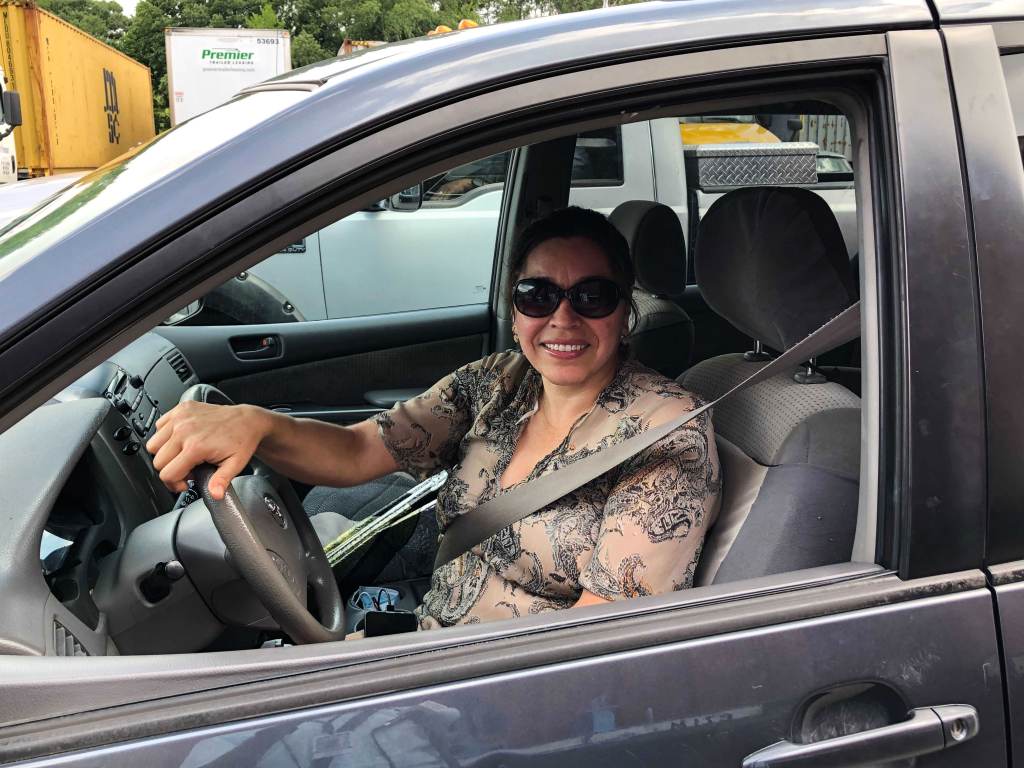
“Last year, [they] gave me too much money,” Sanchez said.
She said she has since returned the overpayment. However, her claim remains in limbo, because the state’s unemployment system still reflects the error.
Until the problem is fixed, the East Windsor resident said she has no money coming in and has been relying on food pantries to keep her husband and three children fed.
“Thank God,” she adds, “I wish this is every month … especially now because I no making money.”
Making ends meet can still be difficult, even for people with jobs.
William Raymond, of Hightstown, works as a union carpenter in New York City.
“I work 40 hours a week and I still can’t make it,” he said.
Raymond said his paycheck is “not too much” as a second-year apprentice, adding that it’s not enough to cover rent, car insurance, utility bills, and food. This is the second time he has visited a food pantry.
“I try to only use it as needed,” he said.

Food banks and pantries have seen a significant rise in demand for their services since the start of the pandemic. Rise has seen a 300% increase in people using its services. TASK, which serves all of Mercer County, has seen an increase in its meal production of about 70%, according to Michelle Wexler, the organization’s development and marketing director.
“The effects of the pandemic are far from over for the folks that we serve,” she said, adding that collaborations like the one with Rise are necessary to serve everyone.
The bill creating the Office of Food Insecurity Advocate would be a game-changer in a state where an estimated 1 million people are food insecure, one-third of them children, said Koppel.
Under the bill, the advocate would create campaigns to increase enrollment in food insecurity programs, such as the Supplemental Nutrition Assistance Program, and coordinate outreach and communication with food banks and pantries. The advocate would also encourage the reduction of waste and the distribution of fresh produce and proteins at food banks, and create a 24-hour toll-free hunger hotline to help improve access to information about available programs.
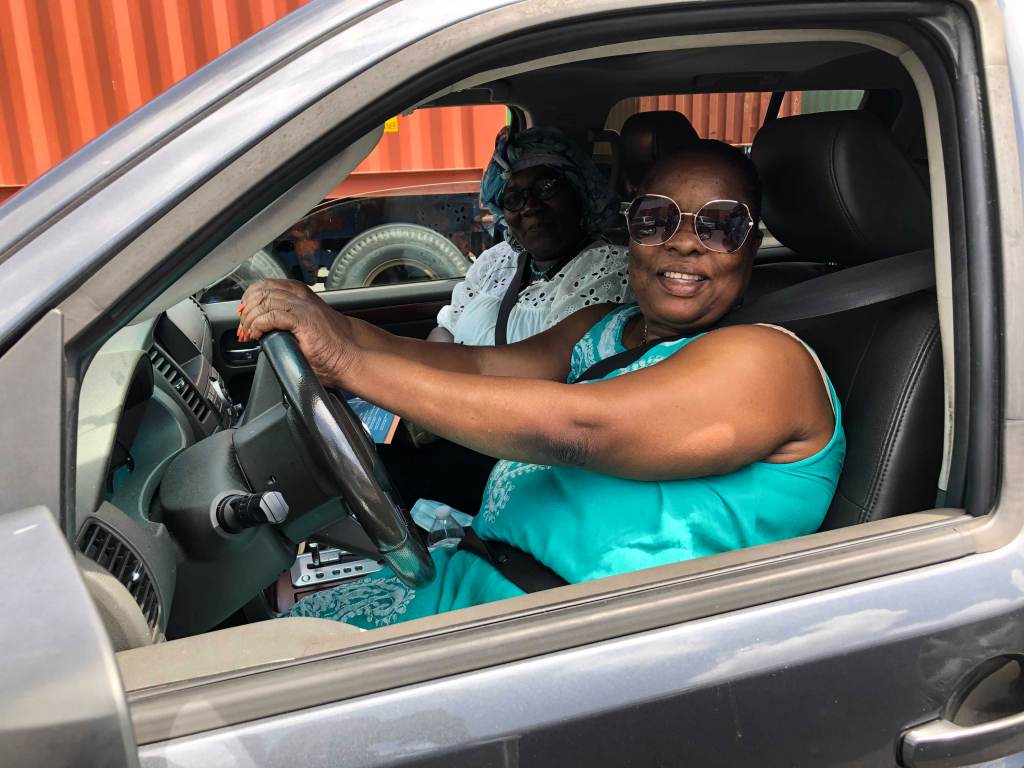
It is not clear whether Gov. Phil Murphy will sign the bill; his office generally does not comment on pending legislation before he signs.
Should Murphy give his approval, Koppel said she hopes the advocate would address issues that go beyond food, including the equipment needed for distribution.
“We had to put lifts on the back of the truck so that volunteers wouldn’t hurt themselves, like breaking their backs … That’s thousands of dollars,” she explained. “There’s not really any funding in the budget for a pantry that’s outside of the food banks right now to support that.”
Wexler said it’s important to have someone focusing on the issue at the highest levels of state government, attempting to address the root causes of food insecurity.
“The need is increasing and it’s there and it’s real,” she said.
Editor’s note: An earlier version of this story misstated the increase in service for TASK.

Get daily updates from WHYY News!
WHYY is your source for fact-based, in-depth journalism and information. As a nonprofit organization, we rely on financial support from readers like you. Please give today.




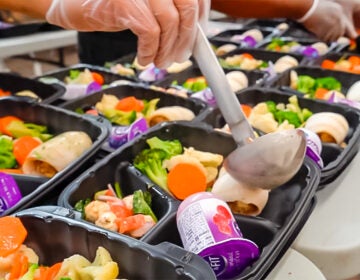
![CoronavirusPandemic_1024x512[1]](https://whyy.org/wp-content/uploads/2020/03/CoronavirusPandemic_1024x5121-300x150.jpg)
